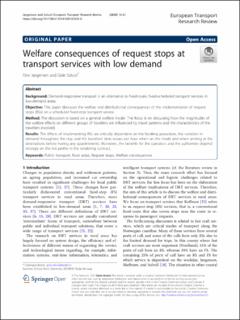Welfare consequences of request stops at transport services with low demand
Peer reviewed, Journal article
Published version
Permanent lenke
https://hdl.handle.net/11250/2660987Utgivelsesdato
2020Metadata
Vis full innførselSamlinger
Originalversjon
Jørgensen, F. & Solvoll, G. (2020). Welfare consequences of request stops at transport services with low demand. European Transport Research Review, 12: 31. doi: 10.1186/s12544-020-00426-6Sammendrag
Background: Demand-responsive transport is an alternative to fixed-route, fixed-scheduled transport services in low-demand areas.
Objective: This paper discusses the welfare and distributional consequences of the implementation of request stops (RSs) on a scheduled fixed-stop transport service.
Method: The discussion is based on a general welfare model. The focus is on discussing how the magnitudes of the welfare effects on different groups of travellers are influenced by travel patterns and the characteristics of the travellers involved.
Results: The effects of implementing RSs are critically dependent on the booking procedure, the variation in demand throughout the day, and the travellers’ time values per hour when on the mode and when arriving at the destinations before having any appointments. Moreover, the benefits for the operators and the authorities depend strongly on the risk profile in the tendering contract.

